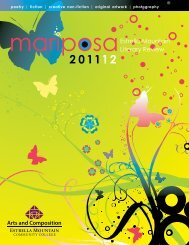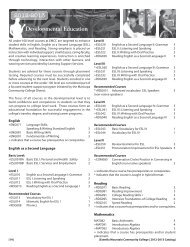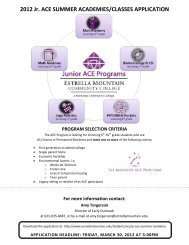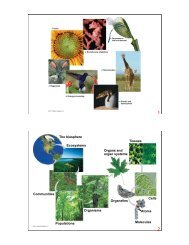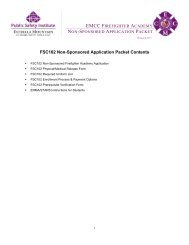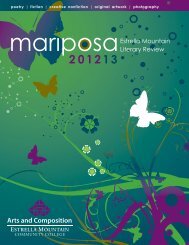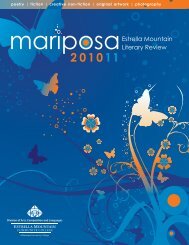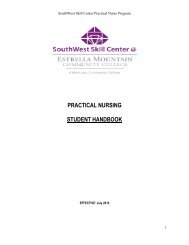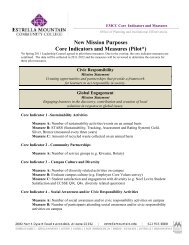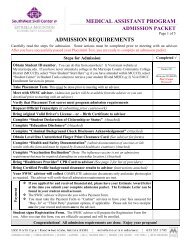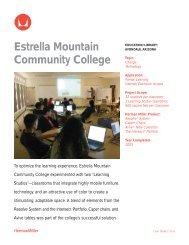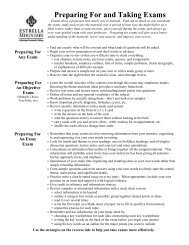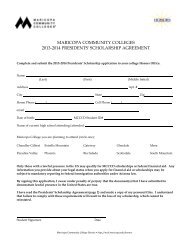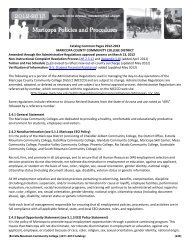Syllabus - Estrella Mountain Community College
Syllabus - Estrella Mountain Community College
Syllabus - Estrella Mountain Community College
Create successful ePaper yourself
Turn your PDF publications into a flip-book with our unique Google optimized e-Paper software.
Course <strong>Syllabus</strong>, Vernal Semester 2010 C.E. (Last updated 16 April 2011 C.E.)<br />
BIO181: General Biology for Majors I<br />
Section Number 22767<br />
19 January - 13 May 2011 C.E.<br />
Lecture: MWF 12:00 - 12:50 MON202<br />
Laboratory: W 08:00 - 10:40 MON126<br />
Course Description:<br />
This course treats principles of structure and function of living things at molecular, cellular, and (to a<br />
far lesser extent) organismic levels of organization. Prerequisites: None. One year of high school<br />
chemistry or one semester of college-level chemistry is strongly recommended.<br />
Instructor Information:<br />
Ty C.M. Hoffman, Ph.D.<br />
bio181@cox.net<br />
Office Hours: By appointment<br />
Course Objectives:<br />
1. Describe and apply the scientific method to solve problems in biological context.<br />
2. Describe the characteristics of life.<br />
3. Identify the basic parts of atoms and describe how they influence chemical<br />
characteristics.<br />
4. Analyze the relationships between the structure and functions of the four kinds of<br />
organic molecules found in living things.<br />
5. Identify the parts of a cell and describe their structure and functions.<br />
6. Describe cellular transport, membrane structure and membrane functions.<br />
7. Compare and contrast prokaryotic and eukaryotic cells.<br />
8. Describe the laws of thermodynamics, energy processes, and enzymes as they<br />
relate to biology.<br />
9. Describe the purpose and components of cellular respiration.<br />
10. Describe the purpose and components of photosynthesis.<br />
11. Describe the biological processes of mitosis, meiosis, DNA duplication, and protein<br />
synthesis.<br />
12. Compare Mendelian and non-Mendelian genetics and use problem solving to predict<br />
the outcome of genetic crosses.<br />
13. Describe gene regulation and effectively analyze the various biotechnological<br />
applications.<br />
14. Describe the genetic basis of development.<br />
15. Demonstrate knowledge of laboratory safety skills and procedures.<br />
16. Practice principles of scientific method while conducting laboratory activities and<br />
experiments.<br />
17. Perform laboratory activities using relevant laboratory equipment, chemical reagents,<br />
and supplies to observe biological specimens, to measure variables, and to design<br />
and conduct experiments.<br />
18. Operate light microscopes, prepare wet-mount slides, and use stains.<br />
19. Exhibit ability to use pipettes and other volumetric measuring devices, chemical<br />
glassware, balances, pH meters or test papers, spectrophotometers, and separation<br />
techniques, such as chromatography an electrophoresis to perform activities relevant<br />
to other course competencies.<br />
20. Develop graphing skills manually and/or by using appropriate computer software.<br />
21. Calculate and make molar and/or percent solutions of varying concentrations.<br />
22. Analyze and report data generated during laboratory activities and experiment.
Course Website:<br />
In addition to the required Blackboard site, this course will use an optional site accessible through<br />
MyLabsPlus. More information about that appears on Blackboard.<br />
Be sure to check Blackboard often. You are REQUIRED to check, even if nothing changes. The<br />
website includes (or will include) various resources to help you succeed. It is also where official<br />
announcements will be posted (whether I make those announcements in class or not). Failure to<br />
notice an announcement posted on Blackboard will not be a valid excuse for not knowing about an<br />
official announcement, so check the website frequently. Be sure to bookmark the following URL:<br />
http://www.estrellamountain.edu/hoffman<br />
At that site, you'll have access to most of the materials on Blackboard even when Blackboard fails.<br />
Supporting Texts (See note about textbooks on the Blackboard website):<br />
The textbook, though hefty, should be brought to lecture and laboratory periods, as it provides many<br />
useful visual illustrations.<br />
Attendance:<br />
I expect you to attend every lecture. Doing so is important to earning a satisfactory grade. I do not<br />
grant you any points simply for attending, but you might lose points for not attending. I also expect<br />
you to appear in the classroom early enough so that you are completely ready to begin taking notes<br />
at the scheduled beginning of class. Tardiness is rude and disruptive, and it can result in loss of<br />
points as well. If you are unable to make it to class on time, then you have enrolled in the wrong<br />
section. You MUST attend every laboratory meeting if you want to avoid loss of points.<br />
My Absolutely Rigid Policy on Missing Lecture Examinations:<br />
It's important for everyone to be aware of the policy regarding make-up lecture examinations. If you<br />
fail to complete a scheduled lecture examination by the deadline for that examination, there will be no<br />
official penalty for missing the examination. However, it is my strict policy that multiple-choice lecture<br />
examinations may be taken only when they are scheduled to be taken (i.e., per the most recently<br />
updated syllabus). This means that all make-up lecture examinations will consist of short-answer or<br />
essay type questions. NO MAKE-UP LECTURE EXAMINATION WILL EVER BE A MULTIPLE-<br />
CHOICE TEST. To ensure that you fully understand my policy, please re-read the previous sentence.<br />
The material treated on a make-up examination will be the same material treated on the<br />
corresponding multiple-choice version. In that sense, one can say that the make-up examinations are<br />
therefore no more difficult. But for many students in my experience, scores on short-answer tests are<br />
significantly lower than those on multiple-choice tests. This is because doing well on a short-answer<br />
test requires that you truly know what you're talking about. Guessing is much less likely to net you a<br />
correct answer. I'm telling you this, on the one hand, to make the official policy known. But even more<br />
importantly, I'm telling you this to strenuously dissuade you from missing a lecture examination for<br />
any but the most unavoidable of reasons. Doing well in this class REQUIRES that you make the class<br />
a priority. Therefore, if you'd like to receive a good grade, you would do well to save excuses for the<br />
other things that might coincide with the test dates, not vice-versa.<br />
Disability Statement:<br />
The college will make reasonable accommodations for persons with documented disabilities.<br />
Students should notify Student Services and their instructors of any special needs.
Schedule of Topics to be Treated:<br />
Week Date Lecture Topic Laboratory Exercise<br />
17 Jan. Observance of TRMLKJ Day (no meeting)<br />
Laboratory Safety<br />
01 19 Jan. Ch. 01: Introduction: Themes in the Study of Life<br />
Metric System<br />
21 Jan. Ch. 01: Introduction: Themes in the Study of Life<br />
How Big is a ...?<br />
24 Jan. Ch. 02: The Chemical Context of Life<br />
Equipment<br />
02 26 Jan. Ch. 02: The Chemical Context of Life<br />
Measuring Liquids<br />
28 Jan. Ch. 03: Water and the Fitness of the Environment<br />
Scientific Method (salt water)<br />
03<br />
31 Jan.<br />
02 Feb.<br />
04 Feb.<br />
Ch. 03: Water and the Fitness of the Environment<br />
Ch. 04: Carbon and the Molecular Diversity of Life<br />
Ch. 04: Carbon and the Molecular Diversity of Life<br />
Molecular Modeling<br />
Solvent Properties<br />
07 Feb. Lecture Examination 1<br />
04<br />
09 Feb.<br />
Ch. 05: The Structure and Function of Large Biological<br />
Molecules<br />
Organic Chemistry<br />
11 Feb.<br />
Ch. 05: The Structure and Function of Large Biological<br />
Molecules<br />
05<br />
14 Feb.<br />
16 Feb.<br />
Ch. 05: The Structure and Function of Large Biological<br />
Molecules / Ch. 06: A Tour of the Cell<br />
Ch. 06: A Tour of the Cell<br />
Membranes and Osmosis<br />
18 Feb. Ch. 06: A Tour of the Cell<br />
21 Feb. Observance of Presidents' Day (no meeting)<br />
06 23 Feb. Ch. 07: Membrane Structure and Function<br />
Microscopy<br />
25 Feb. Ch. 07: Membrane Structure and Function<br />
28 Feb. Lecture Examination 2<br />
07 02 Mar. Ch. 08: An Introduction to Metabolism<br />
Cell Structure<br />
04 Mar. Ch. 08: An Introduction to Metabolism<br />
08<br />
07 Mar.<br />
09 Mar.<br />
Ch. 08: An Introduction to Metabolism / Ch. 09: Cellular<br />
Respiration: Harvesting Chemical Energy<br />
Ch. 09: Cellular Respiration: Harvesting Chemical Energy<br />
Energy<br />
Calorimetry<br />
11 Mar. Ch. 09: Cellular Respiration: Harvesting Chemical Energy<br />
14 Mar.<br />
09 16 Mar.<br />
18 Mar.<br />
Vernal Hiatus (Diligent Study Time)<br />
21 Mar. Ch. 10: Photosynthesis<br />
10 23 Mar. Ch. 10: Photosynthesis<br />
Enzymes<br />
25 Mar. Review<br />
11<br />
28 Mar.<br />
30 Mar.<br />
01 Apr.<br />
Lecture Examination 3<br />
Ch. 12: The Cell Cycle<br />
Ch. 12: The Cell Cycle<br />
Cellular Respiration<br />
Photosynthesis<br />
12<br />
13<br />
14<br />
04 Apr.<br />
06 Apr.<br />
08 Apr.<br />
11 Apr.<br />
13 Apr.<br />
15 Apr.<br />
18 Apr.<br />
20 Apr.<br />
Ch. 16: The Molecular Basis of Inheritance<br />
Ch. 16: The Molecular Basis of Inheritance<br />
Ch. 16: The Molecular Basis of Inheritance<br />
Ch. 17: From Gene to Protein<br />
Ch. 17: From Gene to Protein<br />
Ch. 17: From Gene to Protein<br />
Ch. 17: From Gene to Protein<br />
Lecture Examination 4<br />
DNA Sessions:<br />
• DNA and RNA Structure<br />
• Geometry of Life Video<br />
• Gene Expression Modeling Activity<br />
• DNA Replication / Cell Cycle<br />
• Sex Determination video<br />
• Remembering the Romanovs<br />
22 Apr. Ch. 13: Meiosis and Sexual Life Cycles<br />
15<br />
25 Apr.<br />
27 Apr.<br />
29 Apr.<br />
Ch. 13: Meiosis and Sexual Life Cycles<br />
Ch. 14: Mendel and the Gene Idea<br />
Ch. 14: Mendel and the Gene Idea<br />
Meiosis Modeling<br />
Reebops<br />
02 May Ch. 15: The Chromosomal Basis of Inheritance<br />
16 04 May Ch. 15: The Chromosomal Basis of Inheritance<br />
Laboratory Practicum<br />
06 May Ch. 15: The Chromosomal Basis of Inheritance<br />
FW Lecture Examination 5<br />
Disclaimer:<br />
Course content and point allocation may vary from this outline to meet the needs of this particular group.<br />
Point Distribution:<br />
There will be five lecture examinations, each of which will be worth 120 points. The fifth of these will<br />
treat only the material from the final fifth of the semester (i.e., it will not be a comprehensive final<br />
examination). Each laboratory meeting will feature a pre-laboratory assignment (10 points) and a<br />
post-laboratory quiz (20 points). You should expect a post-laboratory quiz to be given PROMPTLY at<br />
the beginning of each laboratory meeting (11:00), starting with the second meeting. Tardiness will<br />
cause you to lose quiz points or make you ineligible to take the quiz. If your schedule will not allow<br />
you to get to the lecture room or laboratory on time, then you have chosen the wrong section for this<br />
course, and you should immediately withdraw and reschedule. In addition, three laboratory reports
(20, 30, and 40 points) will be assigned. Specific instructions for writing each of these are found in the<br />
laboratory manual. The final laboratory meeting will feature a laboratory examination worth 50 points.<br />
Attendance, participation, etc. will count for up to 20 points.<br />
Grades:<br />
The minimum final scores for the respective letter grades are given below.<br />
86% A<br />
76% B<br />
66% C<br />
56% D<br />
Laboratory:<br />
You must be concurrently enrolled in Section 22769. Attending the laboratory meetings requires that<br />
you bring goggles and wear closed-toed shoes. The laboratory manual will be provided (one time<br />
only) as loose photocopies. You should bring a three-ring binder in which to keep the manual. Extra<br />
copies will not be provided, but PDF's are available for printing on your own.<br />
MCCD Policies and Procedures:<br />
<strong>Estrella</strong> <strong>Mountain</strong> and all Maricopa <strong>Community</strong> <strong>College</strong>s are governed by the same policies<br />
and procedures which include information about nondiscrimination, compliance with<br />
regulations, health concerns, admissions, residency guidelines, financial assistance,<br />
academic advising, assessment, articulation, registration, tuition and fees, refunds,<br />
attendance, grading, records, and scholastic and disciplinary standards. These policies can<br />
be found in the academic catalog and student handbook and it is each student’s responsibility<br />
to be informed of this information.



